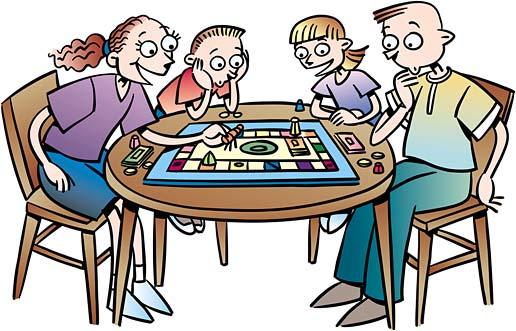Family Game Night
The parents are watching TV or catching up on work and chores. The kids are in their rooms doing homework, or wasting time on their computers, cell phones and video games. The conversation is minimal, and the silence can be deafening.
It’s a scene that is all too common in homes across the country. The time demands of modern life and the stresses that come with it often create a tunnel-vision reality that prevents us from seeing the obvious: Every evening spent as a group of individuals sharing only the same roof represents a loss of precious family time that cannot be recaptured. As a parent and a leader of the household, your mission is to find a way to seize the moments and make family memories that will endure.
Family experts contend that one of the best ways to create a happy and healthy home environment is by holding a regular family game night. Affordable, convenient and flexible, it’s the best way to foster good-natured competition, teamwork and interaction through entertainment. Although starting and maintaining a regular event can be difficult, holding a game night will have positive and lasting impacts on the entire family. But the benefits go beyond building stronger family bonds; they can be educational too. There is evidence that playing board games regularly can:
- Improve memory
- Boost critical thinking amongst teens and ‘tweens
- May help students perform better in math tests
- Help kids become better students
- Increase deductive reasoning and critical thinking skills
- Lead you to have more fun!
So grab your calendar and dig up those dusty old board games. Here are six tips for getting the whole family on board for some quality time only a game night provides:
1. Make It A Regular Event

The best way to establish a regular game night is by scheduling it on a specific date. This allows everyone to plan their time accordingly, which is another good life skill for children to learn. Even in the busiest households there is at least one common window of opportunity for holding a game night, but it will rarely happen without a little advanced planning.
The concept of time isn’t necessarily grasped by younger children immediately, especially understanding how long planning events can take. Older adolescents tend to understand routines and arithmetic a bit better than their younger counterparts, but both need guidance in time management. You can use their understanding of time regularity to build excitement for family game night, and it will have the same effect on parents too. Post reminders on the fridge and make a special meal or snack to mark the event. Game night is a great opportunity to let go of the outside world, even if it’s only for a moment.
2. Be Conscious of Time Limits:

Time flies when you get wrapped up in a game, so it’s important to put a cap on the competition. Many board games, like Monopoly or Life, require more time to play a complete game, so it’s vital to pick the right games to suit your time limits, or make sure the family is aware that they will likely have to pick up the game later. Remember, the idea is to have fun, not to get in the way of responsibilities:
3. Practice Good Sportsmanship:

Another valuable teaching moment family game night provides is the importance of practicing good sportsmanship. Showing respect for the rules and others, learning how to be a good winner and a good loser, and believing in fairness and teamwork can all be healthy by-products of playing games together as a family.
Monopoly is notorious for causing family feuds, but that doesn’t mean you shouldn’t play, it just gives your family a chance to brush up on diplomacy and sportsmanship. Be prepared to explain to the kids that sometimes you can do everything right and still fail. Good sportsmanship skills will come in handy in many situations throughout life, and it’s better to learn the skill sooner among family rather than later in public.
4. Plan for Breaks:

Even if you have limited time to play games, make sure to take at least one break to give everyone’s brain a breather. Scientists claim that teens and adults are able to focus on one subject for around 20 minutes, but that number goes down with age. Avoid turning the younger ones off with the boredom of a board game that drags on forever by taking a mid-game timeout for refreshments and bathroom breaks.
5. Turn off the TV:

Unless your family game night is all about video games, make sure to turn off the TV. The sounds and images can be a major distraction that interrupts and delays the games with divided attentions. Engagement with the game and family should be a primary focus of the night. It may seem simple enough, but it can be hard to break old habits. Try a little light classical music or a family favorite radio station on low volume.
6. Keep a Healthy Rotation:

While some kids like to do the same things over and over again (like watching the same movies or playing the same video games ad nauseam), it’s important to switch up the routine. There is a rich variety of games out there to be explored, and introducing new concepts and strategies are one of the many benefits of family game night. Of course, everyone will have their favorites, but that just gives your kids more reason to want to play again.
You can get creative with family game night too. For example, take a game with you on an out-of-town trip, or go out for pizza night and bring a game along. Family game night doesn’t have to be limited to indoor activities either. You can always turn it into a family night out with a field trip to play mini-golf, go bowling, play at the arcade, or a enjoy an active night out at Rockin’ Jump Madison for some fun and safe play time.

Rockin’ Jump Trampoline Park
Any open time of the week can be transformed into something a little more magical and fun. So if you think family game night is impossible, try to take small positive steps to make it happen and establish it as a family tradition. You and your children will remember it long into the future.

